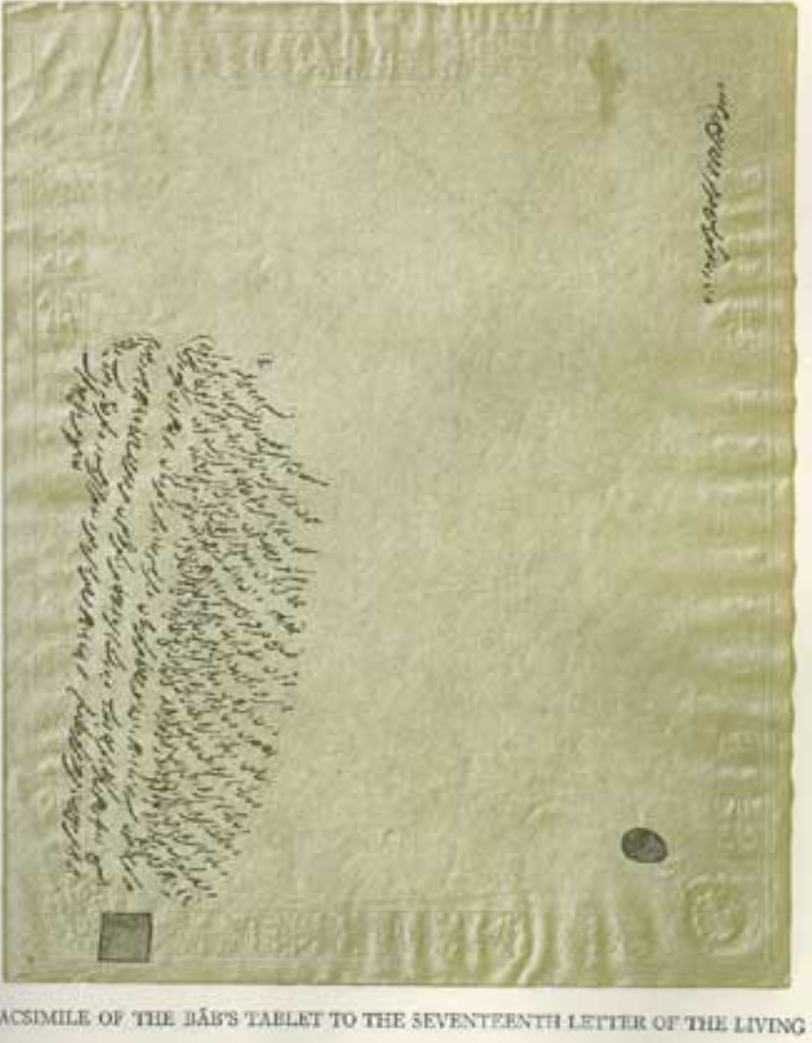
Tablet to the Bab to the Seventeenth Haykal (Temple) [Letter of the Living] Fātimah Baraghāni, the daughter of Muhammad Salih Baraghāni, known as Ṭāhirih (The Pure One), Qurrat al-`Ayn (The Solace of the Eyes) (d. Tehran, 1852).
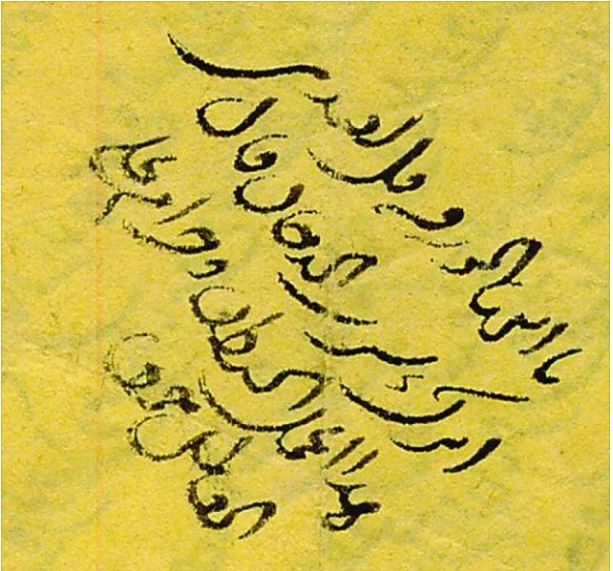
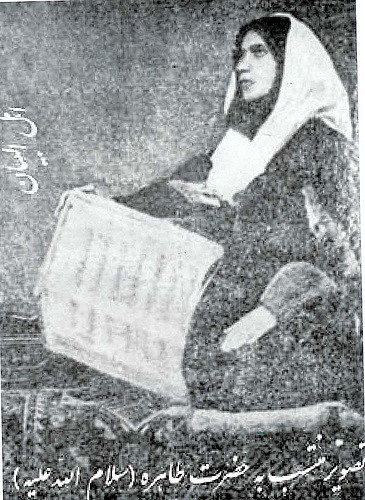
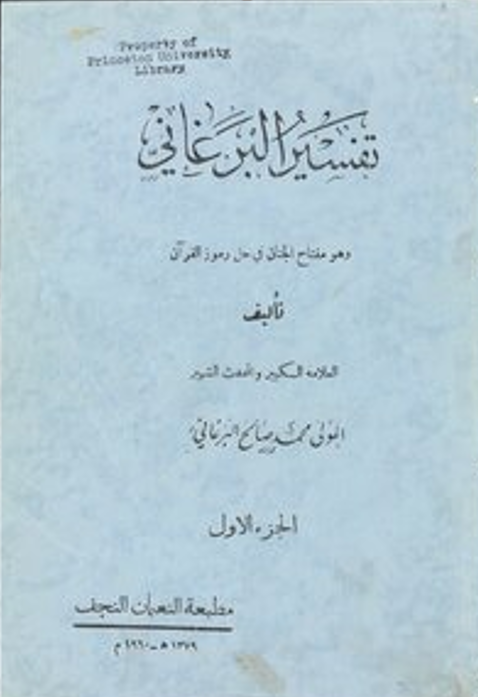
Handwriting of Ṭāhirah - An image popularly taken to be that of Ṭāhirah, Qurrat al-`Ayn (d.1852 CE). To the right is an image of a partial edition of one of her father's Arabic Qur'an Commentaries, the Tafsir al-Baraghani.
Tablet to the 17th Haykal or Letter of the Living within the first Vahid ("Unity"), Fatimah Baraghani, Ṭāhirah, Qurrat al-‘Ayn translated from the Arabic text in the handwriting of the Bab printed in facsimile in the Dawn-Breakers... of Nabil-i Zarandi (d. 1892) edited by Shoghi Effendi Rabbani (d. London, 1957), the late Guardian of the Baha'i religion and first printed in 1932.
Translation Stephen Lambden, UC Merced, 2020-2022.
IN PROGRESS
Under revision and correction - last updated 15-10-2021.
[A]

This is what We sent down unto the Seventeenth Haykal (Temple, Personage), A Logos-Command (amr an) from before God, the Mighty (al-`Aziz), the Mighted (al-‘Ayzūz [sic.])!
[B]

Huwa = "He is".
[C]
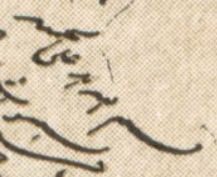
Bismillāh al-a`lā al-ḥamīd.
In the Name of God, the Most Transcendent, the One Praiseworthy!
[I]
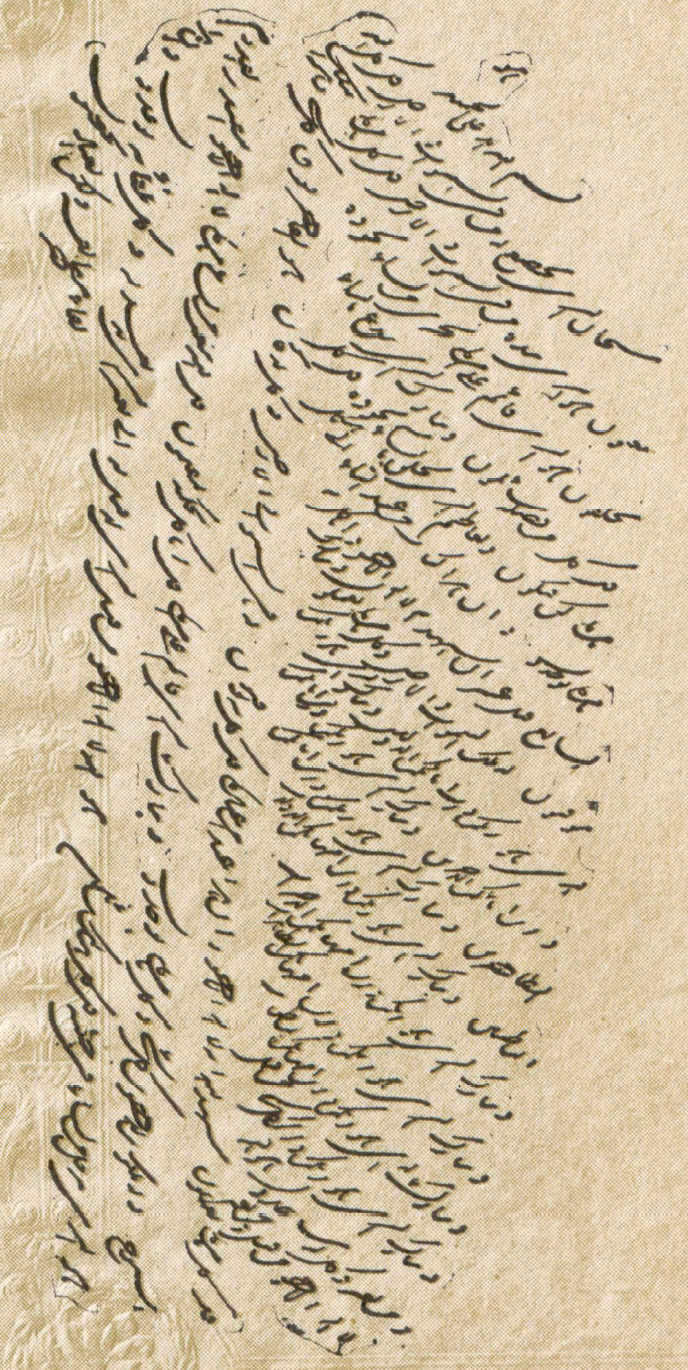
[I]
[1] Glorified (subhān) be He before whom are humbled whomsoever is in the heavens and upon the earth. [2] Say: All are raised up unto Him. [3] He is the One in whose hand is whomsoever exists within the heavens and upon the earth. [4] Say: All through his Logos-Command (amr) were created.
[II]
[1] He is the One who is Upstanding on account of His Logos-Command (qā'im `ala amrihi). [2] He rewardeth whomsoever He willeth through His Bounty (jūd). [3] Say: All are permitted to make requests [pose questions] (al-sā'ilūn) on account of His bounteous grace (faḍl).
[4]
And Blessed be (تَبَارَكَ , tabāraka)
He who created whatsoever He willeth through his Logos-Command (bi-amrihi),
[by means of the utterance of the Qur'anic creative imperative]
كُنْ فَيَكُونُ
"Be! And it is!" (see Q. 2:117; 3:47, 59, etc]!
[5] And He giveth Might unto He whom He created, just as He willeth through His Divine Bounty.
[6] Say: All, by virtue of His Logos-Command (amr), are unified [w-ḥ-d- II or `regulated'].
[III]
[1] This is a letter [book] from before [the Letter] al-Thā' [al-Thamarah = the Fruit = the Bab], unto the seventeenth Temple (haykal). So bear witness that He, no God is there except Him. We are all believers in Him. The dominion of the heavens and of the earth belongeth unto Him, and all are active on account of His Logos-Command.
[IV]
[The Four Patrilineal Blessings]
![]()
و تَبَارَكَ
- [1] So Blessed be (wa tabāraka) He who is thy Lord, and the Lord of thy primordial [past, patrilineal ] forefathers (abā'ikum al-awwalin)
- [2] And Blessed be (tabāraka) He who is thy Lord and the Lord of thy eschatological [latter-day, future, patrilineal] fathers (abā'ikum al-ākhirin) .
- [3] And Blessed be (tabāraka) unto He who is thy Lord and Lord of your exoteric [concrete, outer, patrilineal] forefathers (abā'ikum al-zāhirin) .
- [4] And Blessed be (tabāraka) unto he who is thy Lord and Lord of your esoteric [inner, patrilineal] forefathers (abā'ikum al-bātinrin).
[V]
[The Four Matrilineal Blessings].
![]()
و تَبَارَكَ
- [1] And Blessed be (tabāraka) unto he who is thy Lord and Lord of your primordial [past, matrilineal] mothers (ummahāt al-awwalāt) .
- [2] And Blessed be (tabāraka) unto he who is thy Lord and Lord of your eschatological [latter-day, future, matrilineal] mothers.(ummahāt al-ākhirāt) .
- [3] And Blessed be (tabāraka) unto he who is thy Lord and Lord of your exterior [outer, matrilineal] mothers (ummahāt al-zāhirāt) .
- [4] And Blessed be (tabāraka) unto he who is thy Lord and Lord of your esoteric [inner, matrilineal] mothers (ummahāt al-bātināt).
[VI]
[The Supplementary Blessing].
- [5] And Blessed be (tabāraka) unto he who is thy Lord and Lord of everything (kull shay'), both from before and from after (min qabl wa min ba`ad). [2] And all before Him do fall prostrate [3] He is God, no God is there except Him. [4] This from before as well as from after (min qabl wa min ba`ad).
[VII]
[1] Say: All are active by virtue of his Logos-Command. [2] God testifieth that He, no God is there except Him. [3] This is a servant (`abd) from among His servants (`ibād).
[VI]
[1] Say: All are assured regarding Him. [2] Whatsoever is in the heavens and the earth belongeth unto Him. [2] And all before Him are upstanding. (qā’imun). [3] He is one Wrathful (qāhir) above everything. [4] And He is the King (al-malik), the One Glorified (al-subbuh). [4] His is the Kingdom of the Divine Realm of everything (malakut lahut kull shay'). And all by virtue of His Logos-Command, are united.
[VII]
[1] And Blessed be (تَبَارَكَ , tabāraka) He who is Upstanding [qā'im] by virtue of His Logos-Command (qā’im `ala amrihi).
[2] Say: We are all indeed, on account of His decree, ones resurrected.
[3] Say: God raiseth up whomsoever He willeth by virtue of His Logos-Command.
[4] For there is no God except Him, the Powerful, the Self-Subsisted (qaddūm) [sic.].
[VIII]
[1] He is the one who causeth to enter whomsoever he willeth into His Paradise.
[2] Say: All at this moment are such as make enquiry [are allowed to pose questions].
[3] He is God, no God is there except Him, before He who before whom there was no before.
[4] Unto and after He for whom there is no after for Him.
[IX]
[1] And all are promised about His Encounter-Meeting (liqā’). [2] And this is the Encounter-Meeting with the Manifestation of His Self. [3] This, although the servants remained veiled.
Seal 1
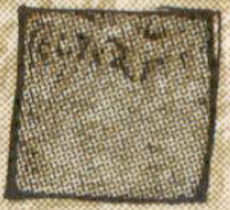
Sealed : His servant, the [messianic] Dhikr (Remembrance),
Seal 2
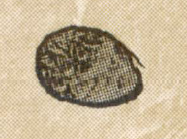
♦
Ā Ī Ū ā ī ū Ḍ ḍ ḥ Ḥ ṣ Ṣ ṭ Ṭ ẓ Ẓ
Ā Ī Ū ā ī ū Ḍ ḍ ḥ Ḥ ṣ Ṣ ṭ Ṭ ẓ Ẓ
Select Notes on the Tablet of the Bab to Tahirah
The eight (4+4) and several (three) other tabaraka blessings (four male and four female centered), one earlier, one supplementary, and one later, totalling eleven. These `Tabāraka' or 'Blessed be' verses on male and female forbears, and perhaps future descendants of Tahirah, are especially apt since she had outstanding male and female relatives, and forebears; some were brilliant, others anti-Shaykhi and anti-Babi-Baha'i. Two of her relatives were also `Letters of the Living' and brothers as sons of the great Mujtahid, Shaykhi and perhaps crypto-Babi `Abd al-Wahhab Qazvini (d. c. 1854 see below) though one of these two became an Azali Babi and received a number of important alwah or Tablets from Baha'-Allah (Lawh-i Hajji Mulla Hadi Qazvini).
The eleven تَبَارَكَ - `Tabāraka' or 'Blessed be!' verses relate in two fourfold groups to male and female forbears and descendants, of the past and of the future. The Bab as the eschatological Imam and return of Imam `Ali (s. 40/661) may well here have been be inspired in these nine plus two `Tabaraka verses' by the following lines of the خطبة الطتنجية Khutba al-Tutunjiyya [Tantanjiyya], (loosely). the `Sermon of the Gulf' ascribed to Imam `Ali ibn Abi Tālib :
[VII]
أقسم برب العرش العظيم
لو شئت أخبرتتم بابائكم وأسلافكم أين كانوا وممن كانوا وأين هم الآن وما صاروا إليه , فكم من أكل منكم لحم أخيه , وشارب برأس أبيه , وهو يشتاقه ويرتجيه , هيهات هيهات
[1]
I swear by the Lord of the Mighty Throne!
"If I so wished I could inform you of your forefathers (abā') and predecessors (`ancestors', aslāf): [2] including, where they were from, whom they were, where they are now, and how they came to be where they are! [3] How many of you are imbibing [eating] the substance [flesh] of his brother and drinking at the [fountain-] head of his father (sharib bi-ra's abihi; see Q.18:26) and yet longs for him [the father] and wishes to be with him!".
[4]
O how preposterous!
And
O how preposterous!
Again,
O how preposterous!
[5] When what is hidden be disclosed, what is concealed in the breasts cometh to pass and it become known whither conscience roams. [6] I swear by God! you will assuredly have been assembled in groups and been many times returned. [6] And how many are those who, between successive returns (karra wa karra) constitute the multiplicity of signs (aya wa ayat) differentiating between such as have been slain [martyred] and those who have passed away (maqtul wa mayyit). [7] For some there are in the craw of birds (hawasil al-tuyur) and those that are in the insides of beasts (batun al-wahsh) as well as humanity between those that have passed away and those implicit in marital intercourse or between coming and going." (cited Lambden-Fananapazir trans. from Rajab al-Bursi, Mashariq anwar al-yaqin fi asrar Amir al-Mu'minin...)
See further 1-TTNJ | Hurqalya Publications: Center for Shaykhī and Bābī-Bahā’ī Studies (ucmerced.edu) For the fill translation see: ADD URL
From the Tablet of the Bab to the `Letter of the Living' No. 9 - Sa`id-i Hindi.
[XI] : [3] And We are indeed are their Felicity [Bliss, Rapture of Paradise] (al-na`īm) promised by Us in the Book (al-kitāb) [Qur'an 9:21 etc]! This is not the correct reading but nonetheless there is something of a parallel of interest here. See the Qur'anic Surah of the Table Qur'an 5:114
![]()
"For Our first -generations - and for our final eschatological generations ..."
See Qur'ān 5:114 the Surat al-Mā'idah (The Surah of the Table).

"Jesus son of Mary said, "O God, our Lord, send down to us a "Table" (ma'idah) from heaven (al-sama') which may be a festival (`īd an) for us, for [all our generations] present and future (al-awwalinā wa ākhirinā), and a sign (ayat an) from You (minka), and give us provisions (arzuq-nā). You are the best Giver of Provisions (khayr al-raziqīna).”
The First and the Last and the Sābiqūn.
On the basis of a few verses of the Qur'an the Bab came to refer to his first or early disciples as the sābiqūn (a Qur'anic plural active participle) or "forerunners" or "outstrippers" (so Arberry in his Q, trans page 1058 "SABAQA vb. (I)-to precede, to go before, to be prior, to outstrip; also the sense of "already", "before". (n.vb.) the act of outstripping, of going before. (pcple. act.) outstripper; outracing. (pcple. pass.) outstripped)" (Kassis, Concordance, 1058}. Also from the same source, the following eight Qur'anic refs to the sābiqun are given (pp.1058-9): "g) pcple. act. (sābiq) [ = refs in Qur'ān ] :
- 9:100 (101) and the Outstrippers, the first of the Emigrants
- 23:61 (63) those vie in good works, outracing to them
- 29:39 (38) they waxed proud in the earth; yet they outstripped Us not
- (29) some are outstrippers in good works by the leave of God35:32
- 36:40 (40) it behoves not the sun to overtake the moon, neither does the night outstrip the day
- (10) and the Outstrippers: (the Outstrippers) 56:10
- 56:10 (10) and the (Outstrippers): the Outstrippers
- 79:4 (4) and those-that outstrip suddenly".
ADD HERE EI2 Denis MacEoin article on the Sabiqun.

Popular image - not that of Ṭāhirah
Fātimah Baraghāni, Ṭāhirah (The Pure One), Patrilineal and Matrilineal Forebears and Descendants.
Ṭāhirih (The Pure One) (d. 1852) had numerous significant patrilineal, male lines of past and future descent. So too, key matrilineal, female lines of past an future descent. Her forbears, relatives and descendants include many significant figures.
The immediate family of Fātimah Baraghānī, Tāhirah, Qurrat al-`Ayn.
Father of Tahirah
= Hajjī Mulla Muhammad Ṣaliḥ Baraghānī (b. Baraghān, Persia - Iran c. 1200/1785 or 25th of Dhu'l-Qa'dah 1167 / 17th September 1754 [1167/1753] or 1174/1760 - d. Karbala, 1271/ [17th March] 1855 CE). Muhammad Salih Baraghani was a an Usuli Shi`i Mujtahid who around 1817 founded the huge Ṣalihiyya madrasah in Qazvin.
See al-'Āmilī, Sayyid Muḥsin ibn ʻAbd al-Karīm al-Amīn (b. Jabal 'Āmil, 1284/1867-d.1371/1952).
- A`yān = A'yan al-shī'a, 56 parts, 1st ed. Damascus : Maṭbaʻat Dimashq,1935-1963.
- A'yān al-shī'a. Beirut : Maṭbaʻat al-Inṣāf 1950s+
- A'yān al-Shi`a 10 vols. / + Ḥasan al- Amīn 10 suppl. vols., Beirut: Dār al-Ta'āruf li 'l-maṭbū'āt, 1984 +1406/1986 etc.
On Muhammad Ṣaliḥ ibn Muhammad Mala'ikah Baraghānī see Sayyid Muḥsin al-Amin, A`yān al-Shī`a Vol. IX (Beirit 1406/ 1986) : 369ff.
Ḥasan al-Amīn produced ten supplementary volumes to the ten A'yān al-Shi`a referred to above - which are sometimes printed with the original Aʻyān al-Shīʻa vols. and are entitled Mustadrakāt Aʻyān al-Shīʻa. Beirut : Dār at-Taʻāruf li'l-Maṭbūʻāt, 1984, etc. On Muhammad Ṣāliḥ Baraghānī the latter wrote :
"He was born on the 25th of Dhu'l-Qa'dah in the year 1167 [= 17th Septermber 1754] in the city of Baraghān in Iran. And He died in the year 1271/ [17th March] 1855 CE] in Karbala [now in Iraq] and was buried in a specific [family] graveyard (maqbura) in the Rawaq al-Gharbi ... (Ḥasan al- Amīn, Mustadrakāt Aʻyān al-Shīʻa vol. II: 303f).
This source gives the exact birth date (see above) of Muhammad Ṣāliḥ Baraghānī as 1200 AH or 1785 though Momen believes, on the basis of "family records" , that it is more likely to be 1167/1753 (Momen 2003: 320 fn.13). In a more recent source `Abd al-Husayn Shahīdī Ṣāliḥī gives his birthdate as 1167
محمد صالح بن محمد ملائکه برغانی
Writings of the Prolific father of Tahirah, Muhammad Ṣaliḥ ibn Muhammad Mala'ikah Baraghānī .
He was the author of several Arabic multi-volume Tafsir works of which mss. survive in libraries in Qazvin, Qum and possibly elsewhere.
-
تفسیر برغانی = تفسیر بحرالعرفان
تفسیر کبیر و گسترده در ۱۷ مجلد که تا کنون به شکل دستنوشته و در کتابخانه خانواده وی در شهرستان قزوین محفوظ استتفسیر کبیر و گسترده در ۱۷ مجلد که تا کنون به شکل دستنوشته و در کتابخانه خانواده وی در شهرستان قزوین محفوظ است-
تفسیر کبیر = Tafsir Kabir, The Great Commentary in 14 or 17 volumes. Original Ms Survives 1.
تفسیر متوسط = Tafsir Muttawasit, the All-Encompassing Commentary 2.
تفسیر مختصر = Tafsir Mukastasir, The Abbrevisted Commentary 3.
Muhammad Ṣaliḥ ibn Muhammad Mala'ikah Baraghānī allegedly wrote over 300 books and Treatises or Risalas (pl. Rasa'il). They include a number of Arabic commentaries upon the Qur'an, Tafsir works. Parts of at least one - originally in 14 or 17 vols.- have been published. His works relating to the cruel fate of the martyred 3rd Imam Husayn (d. 61/680) remain popular an influential.
Tafsir al-Baraghānī printed in Qazvin.

A fairly recently printed (in Qazvin in 2017) by Tarikh al-Insha' (476 pages) copy of extracts from one of the Qur'an commentaries of Muhammad Salih Baraghani = محمد صالح بن احمد برغاني
♦
Mother of Tahirah - Aminah Salihi Qazvini (b. Qazvin, 1202/1787- d. Qazvin, 1269/1851), a teacher of women in the Ṣāliḥiyya and sister of `Abd al-Wahhāb Qazvinī (d.1853) the stunningly erudite Shaykhi inclined mujtahid who presided over the Shah moque in Qazvini..1853), who was the imam at the Shah Mosque in Qazvin and the father of two of the `Letters of the Living',the main disciples of the Bab.
UNCLES OF TAHIRAH - Her father's brothers, two prominent Shi`i Muslim clerics of great renown were:
[1] Muhammad Taqī Baraghānī son of Muhammad Malā'ikah ibn Shaykh Muhammad Taqī ibn Shaykh Muhammad Ja`far ibn Shaykh Muhammad Kāzim Baraghānī (b. Baraghān 1180/1766-7, d. Qazvin, 1263/1847).
[1] ملا محمد تقی برغانی = Mulla Muhammad Taqī Baraghānī (born Baraghān, 25th Dhu'l-Qa'dah, 1167 / 17th Septermber 1754 - or b. Baraghan,1180/1766-7 d. Qazvin, 1263/1847 ). (See Hasan al-Amin, Mustadrakat, II: 303).
Among his works is the
- Majālis al-muttaqīn on the sufferings of the twelver Imams.
This uncle of Tahirah came to be anti-Shaykhi and excommunicated Shaykh Ahmad al-Ahsa'i for which he was murdered in Qazvin in 1263/1847, Among the twelver Shi`a he came to be entitled Shahīd al-Thālith (the third martyr). Tāhirah divorced and abandoned his son who was her husband from whom she had several children.
- Muḥammad ibn Sulaymān Tunukābunī, Qiṣaṣ al-ʿulamāʾ, Tehran, n.d., pp. 19-66
- Āghā Buzurg Ṭihrānī, Ṭabaqāt aʿlām al-shīʿa II, Najaf, 1956, pp. 226-28.
- Mihdi Bāmdād, Rejāl I, pp. 203-04.
- MacEoin, Denis, BARAḠĀNĪ, MOḤAMMAD-TAQĪ in EIr. Originally Published: December 15, 1988- last Updated: December 15, 1988
Notes on the three Imami Shi`i Shahids, "martyrs". See also
- [1] al-Shahīd al-Awwal (the First Martyr) or al-Shaykh al-Shahīd =
- ابوعبدالله شمس الدین محمد بن مکي بن محمد الشامي العاملي الجزیني = Abū ʿAbd Allāh Shams al-Dīn Muḥammad ibn Makkī ibn Muḥammad al-Shāmī al-ʿĀmilī al-Jizzīnī (b. 734/1333-4 - d. 786/1384) Outstanding Lebanese born Shi`ite jurist and `Alim (Greatly learned one) of the 8th / 14th century. He is especially famous as the author of the encyclopedic fiqh manual entitled Al-Lumʿa al-dimashqīyya fī fiqh al-ʾimāmīyya = اَللُّمعَةُ الدِّمَشقیة في ِفقه الإمامیة also commonly referred to as al-Lum'a اللمعة -> Muhammad ibn Makki - Wikipedia - Scarcia Amoretti, B. "Muḥammad b. Makkī" (1993). in EI2 Volume VII: 407..
- [2] زين الدين بن نورالدین علي بن أحمد العاملي الجُبَعي = al-Shahīd al-Thānī (the Second Martyr) الشهيد الثاني was Zayn al-Din al-Juba'i al-ʿĀmilī (b. Juba' 13th Shawwal 911/ March 9th 1506- d. Rajab 965/ 1558) who wrote a commentary on the al-Lum'a اللمعة of the First Martyr (above). al-Rawda al-Bahiyya fi sharh al-Lum'a al-Dimashqiya as well as Masalik al-afham fi sharh shara'i' al-Islam, and Rawd al-jinan fi sharh Irshad al-Adhhan. See furtherr, Al-Shahid al-Thānī - wikishia
- [3] al-Shahīd al-Thalith (the Third Martyr) (see above) - see further :
- WikiShia Shahid Awwal- Shahid Thānī - Shahid Thālith ...
[2] Muhammad `Ali Baraghānī (d.1269/1852-3), a Shaykhī sympathizer.
UNCLES OF TAHIRAH - Maternal [Mother's] Brothers, one prominent Shi`i Muslim cleric:
- `Abd al-Wahhab Sharif Qazvinī (d. Karbala ? 12XX/1853) a stunningly erudite Shaykhi inclined mujtahid who presided over the Shah moque in Qazvin..1853), who was the imam at the Shah Mosque in Qazvin and the father of two of the `Letters of the Living',the main disciples of the Bab. The Bab referes to him in very elevated terms in one of his letters to him.
AUNTS OF TAHIRAH - The sisters of Aminah Salihi Qazvini
Patrilineal - Male lines of past and future descent
Matrilineal - Female lines of past and future descent.
- Sayyid Muhammad Mahdi, Bahr al-`Ulum ("The Ocean of the Sciences"), (b. Karbala 1742 - d. 1212/1797).
سید مُحَمَّد مهدي بحرالعلوم = Sayyid Muhammad Mahdi ibn Murtada al-Burujirdi al-Tabataba'i, Bahr al-'Ulum ("Ocean of the Sciences") (b. Karbala in Eid al-Fitr, 1st of Shawwal 1155 / November 29, 1742 - d. buried in Najaf, Iraq, 1212/1797). He studied in Karbala, Najaf and Mashhad. He was taught by :
- شیخ یوسف البحراني = Shaykh Yusūf al-Baḥrānī (b.1107/1695 - d. Rabi' I 4, 1186/June 5, 1772
1186/1772). - ADD
- ADD
Among his pupils were
- جعفر بن خضر بن یحیی الجناجی الحلّی النجفی = Jaʿfar ibn Khiḍr ibn. Yaḥyā al-Janājī al-Ḥillī al-Najafī (b. 1156/1743 - d. 1227/1812), or کاشف الغطاء Kāshif al-Ghiṭā' .
- سيد جواد الحسيني العاملي = Sayyid Jawād al-Ḥusaynī al-ʿĀmilī (b. 1160/1747, d. 1226/1811).
- Aḥmad ibn Muḥammad Mahdi ibn Abī Dhar al-Narāqī : احمد بن محمد مهدی بن ابی ذر نراقی or Mulla Aḥmad Narāqī known as al-Fāḍil al-Narāqī (Persian: فاضل نراقی) (b. 1185/1771-1772 – d. 1245/1829) was a son of Mahdi al-Naraqi.
"The mother of his [Bahr al-`Ulum's] father was a descendant of Muhammad Taqi al-Majlisi, therefore Bahr al-'Ulum called the First Majlisi as his ancestor and Muhammad Baqir al-Majlisi as his uncle." (so WikiShi`a). محمد باقر بن محمد تقي بن مقصود علي المجلسي
- [1] Muḥammad Taqī b. Maqṣūd ʿAlī al-Iṣfāhanī = محمد تقي بن مقصود علي الاصفهاني (b. 1003/1594-95 – d. 1070/1660), the First Majlisi
- [2] Muhammad Bāqir (b. 1037/1628-29 – d. 1110/1699) ibn. Muḥammad Taqī (above) ibn Maqṣūd ʿAlī al-Majlisī
Husband was Mullā Muhammad (b. d. ) son of Muhammad Taqī Baraghānī (born Baraghan, 25th Dhu'l-Qa'dah, 1167 /17th Septermber 1754 - d. Karbala, 1271/1854-5). The father just mentioned (uncle of Tahirah herself) came to be anti-Shaykhi and excommunicated Shaykh Ahmad al-Ahsa'i for which he was murdered on 25 October 1847
Children of Tahirah
- ADD
- ADD
Grandchildren of Tahirah
- ADD
- ADD
Sisters of Tahirah
- Mardiyya (Resplendent),
- Rubabeh
- Khadijah-Sultan
Brothers of Tahirah
میرزاعبدالوهاب بن محمدصالح برغانی از آل برغانی
Mirza `Abd al-Wahhab ibn Muhammad Salih Baraghani - evidently named after his mother's brother and uncle the great `Abd al-Wahhab Sharif Qazvini.
Some Babi-Baha'i Texts relating to the spiritual status of Parents, Forbears and Descendants.
A passage from the Lawh-i Qina', the `Tablet of the Veil' (c.1871) of Baha'u'llah on the ancestry of al-Muqanna (b. Balkh d. c. 163/780].
In his Lawh-i Qina', the `Tablet of the Veil' written in response to the person of the anti-Babi Shaykhi leader Hajji Mirza Muhammad Karim Khan-i Kirmani (1810-1871) (see Majmu`ah-yi Alwah-i Mubaraka, p. 68 and details on this website).
"As for that which thoiu hast heard of the mention of al-Muqanna` [b. Balkh d. c. 163/780]. He is famous as al-Muqanna` al-Kindi who is [in fact] Muhammad ibn Zafar ibn `Umayr ibn Fir`ayn ibn Qays ibn Aswad. He was among those deeply informed (al-ma`rufin). If We desired that We might make mention of his forefathers [ancestors], one by one, back until the very ultimacy of the primary era (al-badi` al-awwal), We would be confident that My Lord would so instruct me regarding both the earliest and the latest branches of his family [of knowledge] (`ulum al-awwalin wa'l-akhirin)!"
Here Baha'u'llah claims a detailed knowledge of human ancestry similar to that claimed by the Bab in this Tablet for Tahirah the 17th Letter of the Living'. .
Also of interest in this connection is the following passage from a Tablet of Baha'-Allah about the forgiveness of both parents :
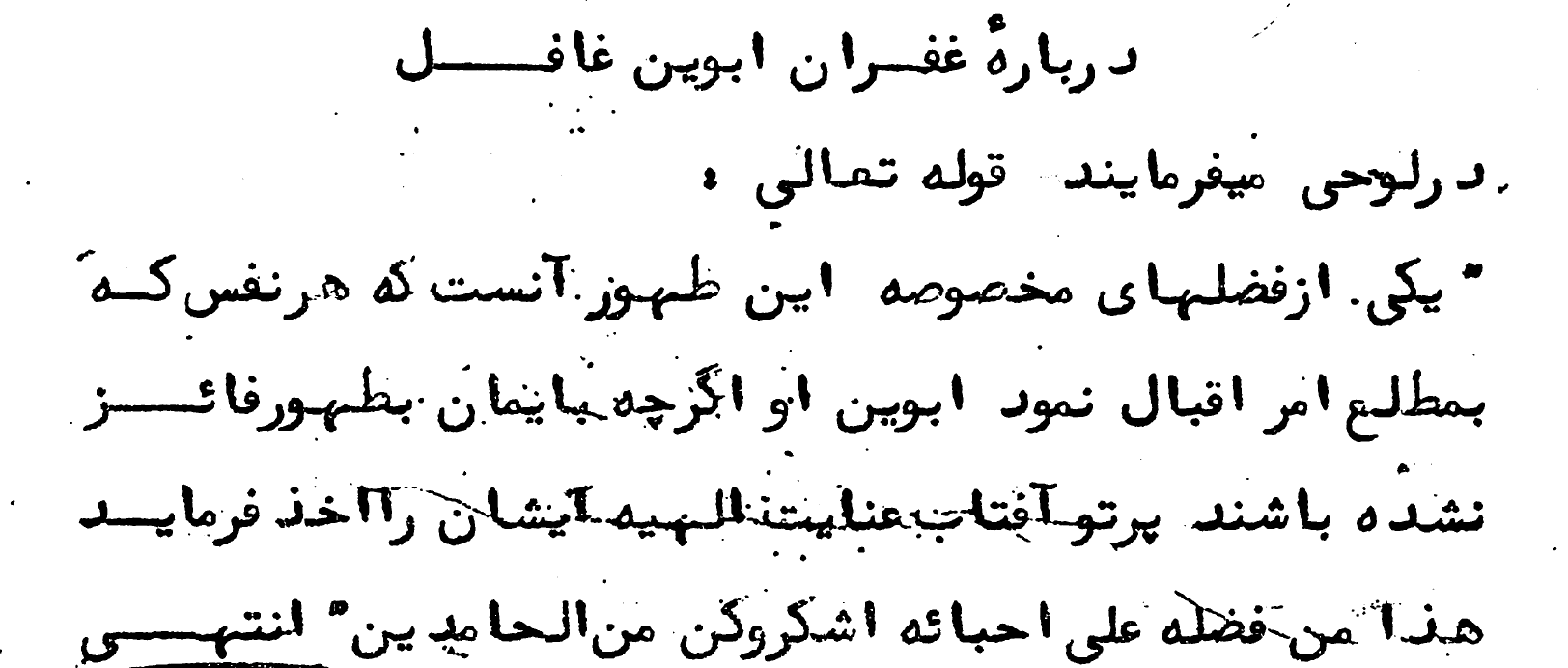
One of the divine bounties (fadlha) specified to this [Babi-Baha'i] Dispensation (zuhur) is that every soul that is inclined towards the Dawning-Place of the Cause [of God] (matali` al-amr) makes it such that both of their parents (mother and father) - even if they do not attain faith in this dispensation (zuhur) [during their lifetimes] - are influenced by a sunbeam of the Sun of the Divine Favour (partow aftāb-i `inayat-i ilāhi). Such is of His Bounty (fadl) towards his loved ones (ahibb'). So render ye gratitude and be thou among such as are given to thankfulness (al-hāmidin)." (Mā'ida-yi āsmani IV:172).



